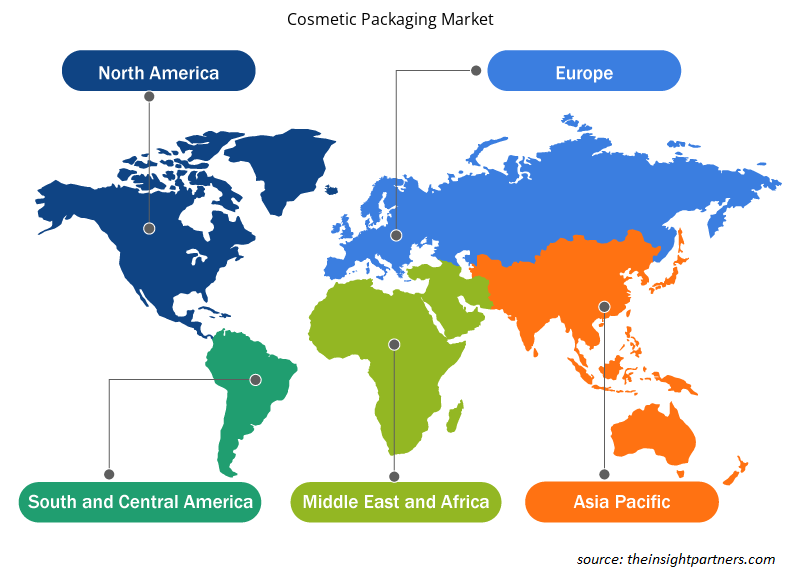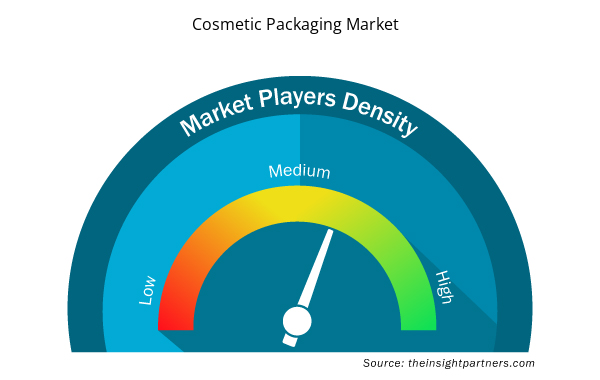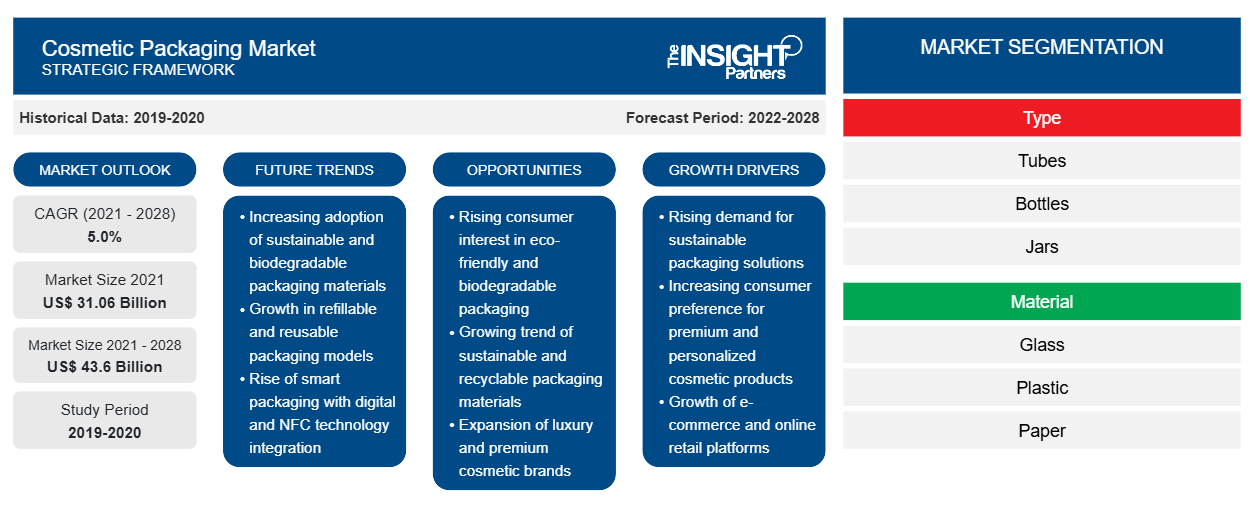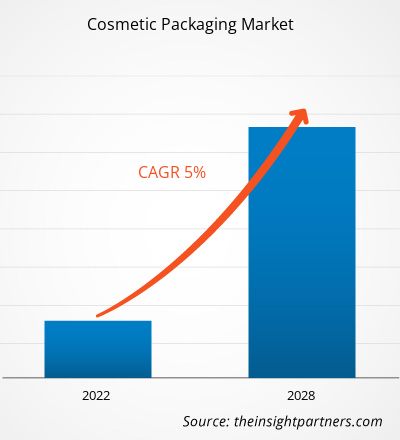2021 年化妆品包装市场价值为 310.647 亿美元,预计到 2028 年将达到 435.979 亿美元;预计 2021 年至 2028 年的复合年增长率为 5.0%。
市场的增长归因于化妆品行业的快速发展;女性化妆的趋势日益明显;以及全球化妆工作室、美容诊所和沙龙的数量不断增加。此外,制造商专注于创造更好的包装设计,并通过创新包装巧妙地推广其产品品牌以吸引消费者。此外,通过在线零售渠道不断增长的化妆品销售额将在预测期内促进市场增长。2020
年,亚太地区占据全球化妆品包装市场的最大份额,预计在预测期内将实现最高的复合年增长率。亚太市场分为中国、印度、日本、韩国和澳大利亚。韩国、中国和日本等国家是化妆品和个人护理产品的主要市场,因为它们独特的化妆和护肤程序越来越受欢迎。由于快速的城市化、显著的经济发展、文化多样性以及新兴化妆趋势的日益普及,亚太化妆品包装市场正在经历显着增长。
定制此报告以满足您的需求
您可以免费定制任何报告,包括本报告的部分内容、国家级分析、Excel 数据包,以及为初创企业和大学提供优惠和折扣
- 获取此报告的关键市场趋势。这个免费样品将包括数据分析,从市场趋势到估计和预测。
COVID-19 疫情对化妆品包装市场的影响
由于不同地区的长期封锁、制造单位停工、旅行、国际贸易和供应链限制以及原材料供应短缺,COVID-19 疫情严重扰乱了制造业的运营效率。由于制造单位停工、原材料价格上涨、劳动力短缺、供应链中断和金融不稳定,COVID-19 疫情对全球化妆品包装市场产生了负面影响。此外,由于 COVID-19 疫情导致的经济放缓,化妆品行业受到干扰,阻碍了化妆品包装市场的增长。然而,随着各国放松先前实施的限制,企业正在取得进展。此外,各国政府推出 COVID-19 疫苗进一步缓解了这种情况,导致全球商业活动增加。此外,各国政府正计划开发现代化和技术先进的基础设施,以减轻疫情对经济的影响。在封锁期间,消费者在家中进行皮肤护理和疗法,这大大推动了对化妆品的需求。因此,尽管受到 COVID-19 疫情的影响,化妆品包装市场预计未来几年仍将实现显着增长。
市场洞察
化妆品行业蓬勃发展
近年来,人们的外貌意识不断增强,导致对化妆品的需求增加。北美和欧洲被认为是全球最大的化妆品市场。根据欧莱雅的数据,2019 年全球化妆品行业的增长率为 5.5%。根据 Cosmetics Europe 的数据,欧洲化妆品市场从 2018 年的 89.30 美元增长到 2019 年的 90.66 美元。此外,由于男女美容趋势的转变,对化妆品的需求增加预计将推动化妆品行业的发展。近年来,该行业已从以女性为导向的产品基础转向服务于所有性别的行业,这扩大了该行业的消费者基础。化妆品行业不断扩大的消费者基础导致对化妆品包装产品的需求旺盛,进一步推动了市场增长。
应用程序洞察
根据应用,全球化妆品包装市场细分为皮肤护理、头发护理、口腔护理等。2020 年,护肤品部分占据了最大的收入份额。越来越多的美容影响者推出了各种化妆和护肤教程,这些教程在人们中越来越受欢迎。此外,使用防晒霜、皮肤修复晚霜和香水等产品的趋势日益增长,推动了对护肤品的需求。化妆品包装用于各种护肤品,如保湿霜、护手霜、清洁剂和去角质剂。护肤品包装旨在保护产品免受空气、光、热、冷、湿气、灰尘和污垢的影响,并防止其被篡改。例如,聚丙烯包装因其灵活性而被广泛用于各种护肤品中,使其成为可挤压管的最佳选择。此外,护肤品牌已经开始认识到护肤品包装的环境效益。
ALBEA;APC PACKAGING;AptarGroup, Inc.;Berry Global Inc.;Gerresheimer AG;WWP Beauty;Silgan Plastics.;Huhtamaki;LIBO Cosmetics;和 HCP Packaging 是化妆品包装市场的参与者。这些公司为市场提供广泛的产品组合。这些公司在发展中地区都有业务,这为化妆品包装市场的增长提供了有利可图的机会。市场参与者正在开发高质量和创新的产品以满足客户的要求。
报告亮点
- 化妆品包装市场的渐进式行业趋势可帮助参与者制定有效的长期战略
- 发达市场和发展中市场采用的业务增长战略
- 2019年至2028年化妆品包装市场定量分析
- 全球化妆品包装需求预测
- 波特的五力分析说明了行业中买家和供应商的效力
- 了解竞争市场状况的最新发展
- 市场趋势和前景以及推动和抑制化妆品包装市场增长的因素
- 通过强调支撑商业利益的市场策略来协助决策过程,从而促进市场增长
- 各节点化妆品包装市场规模大小
- 市场的详细概述和细分,以及化妆品包装行业动态
- 各地区化妆品包装市场规模及增长潜力巨大
化妆品包装市场区域洞察
Insight Partners 的分析师已详尽解释了预测期内影响化妆品包装市场的区域趋势和因素。本节还讨论了北美、欧洲、亚太地区、中东和非洲以及南美和中美洲的化妆品包装市场细分和地理位置。

- 获取化妆品包装市场的区域具体数据
化妆品包装市场报告范围
| 报告属性 | 细节 |
|---|---|
| 2021 年市场规模 | 310.6亿美元 |
| 2028 年市场规模 | 436亿美元 |
| 全球复合年增长率(2021 - 2028) | 5.0% |
| 史料 | 2019-2020 |
| 预测期 | 2022-2028 |
| 涵盖的领域 | 按类型
|
| 覆盖地区和国家 | 北美
|
| 市场领导者和主要公司简介 |
|
市场参与者密度:了解其对商业动态的影响
化妆品包装市场正在快速增长,这得益于终端用户需求的不断增长,而这些需求又源于消费者偏好的不断变化、技术进步以及对产品优势的认识不断提高等因素。随着需求的增加,企业正在扩大其产品范围,进行创新以满足消费者的需求,并利用新兴趋势,从而进一步推动市场增长。
市场参与者密度是指在特定市场或行业内运营的企业或公司的分布情况。它表明相对于给定市场空间的规模或总市场价值,有多少竞争对手(市场参与者)存在于该市场空间中。
在化妆品包装市场运营的主要公司有:
- 阿尔贝亚公司
- APC包装
- 阿普塔集团有限公司
- 贝瑞全球有限公司
- 格雷斯海姆股份公司
免责声明:上面列出的公司没有按照任何特定顺序排列。

- 了解化妆品包装市场主要参与者概况
“2028 年全球化妆品包装市场分析”是一项针对化学品和材料行业的专业深入研究,特别关注全球化妆品包装市场趋势分析。该报告旨在通过详细的市场细分提供市场概述。化妆品包装市场根据产品类型、材料、应用和地理位置进行细分。按类型,化妆品包装市场细分为管、瓶、罐、泵和分配器等。按材料,市场细分为玻璃、塑料、纸张、金属等。按应用,化妆品包装市场细分为皮肤护理、头发护理、口腔护理等。按地理位置,市场大致分为北美、欧洲、亚太地区 (APAC)、中东和非洲 (MEA) 以及南美洲和中美洲。
公司简介
- 阿尔贝亚
- APC包装
- AptarGroup, Inc.
- 贝瑞全球公司
- 格雷斯海姆股份公司
- WWP 美容
- Silgan塑料。
- 胡赫塔迈基
- 俪柏化妆品
- HCP包装
- 历史分析(2 年)、基准年、预测(7 年)及复合年增长率
- PEST 和 SWOT 分析
- 市场规模价值/数量 - 全球、区域、国家
- 行业和竞争格局
- Excel 数据集



Report Coverage
Revenue forecast, Company Analysis, Industry landscape, Growth factors, and Trends

Segment Covered
This text is related
to segments covered.

Regional Scope
North America, Europe, Asia Pacific, Middle East & Africa, South & Central America

Country Scope
This text is related
to country scope.
常见问题
The rise in sustainable and eco-friendly packaging is the key trend for the global cosmetic packaging market. The use of plastic packaging in the cosmetic industry has a harmful impact on the environment. This has led to an increased focus on developing sustainable and environment-friendly packaging.
Based on type, the bottle segment led the global cosmetic packaging market in 2020. Cosmetic products need protection from oxygen exposure, dust and cross-contaminants may affect the quality of the product. Bottles are available in different sizes and shapes, and are made of plastic or glass. Glass bottles are a popular choice for cosmetic packaging. Glass bottles enhance the product packaging in terms of quality.
Based on application, skin care is expected to be the fastest growing segment during the forecast period. The skin care products include face cream, moisturizers, cleansers, face wash, and sunscreen. Continuous technological developments in the cosmetics and personal care sectors coupled with innovations and research & development expenditures are expected to propel the growth of cosmetic packaging.
In 2020, Asia Pacific accounted for the largest share of the global cosmetic packaging market. The cosmetic packaging industry is anticipated to expand faster due to increasing awareness of skin care, hair care, and personal care.
The growth of the cosmetic industry and rising demand for flexible packaging drives the global cosmetic packaging market. Awareness about external beauty has become one of the major driving factors for the use of cosmetics across the globe. Innovative package designs and increasing demand for cosmetics due to the growing youth population are anticipated to drive the market.
Some of the major players operating in the global cosmetic packaging market are ALBEA; APC PACKAGING; AptarGroup, Inc.; Berry Global Inc.; Gerresheimer AG; WWP Beauty; Silgan Plastics.; Huhtamaki; LIBO Cosmetics.; and HCP Packaging.
Trends and growth analysis reports related to Chemicals and Materials : READ MORE..
The List of Companies - Cosmetic Packaging Market
- ALBEA SA
- APC PACKAGING
- APTARGROUP, INC.
- BERRY GLOBAL INC.
- Gerresheimer AG
- HCP Packaging
- Huhtamaki Global
- Libo Cosmetics Co., Ltd.
- Silgan Plastics
- WWP Beauty
- PORATION
The Insight Partners performs research in 4 major stages: Data Collection & Secondary Research, Primary Research, Data Analysis and Data Triangulation & Final Review.
- Data Collection and Secondary Research:
As a market research and consulting firm operating from a decade, we have published and advised several client across the globe. First step for any study will start with an assessment of currently available data and insights from existing reports. Further, historical and current market information is collected from Investor Presentations, Annual Reports, SEC Filings, etc., and other information related to company’s performance and market positioning are gathered from Paid Databases (Factiva, Hoovers, and Reuters) and various other publications available in public domain.
Several associations trade associates, technical forums, institutes, societies and organization are accessed to gain technical as well as market related insights through their publications such as research papers, blogs and press releases related to the studies are referred to get cues about the market. Further, white papers, journals, magazines, and other news articles published in last 3 years are scrutinized and analyzed to understand the current market trends.
- Primary Research:
The primarily interview analysis comprise of data obtained from industry participants interview and answers to survey questions gathered by in-house primary team.
For primary research, interviews are conducted with industry experts/CEOs/Marketing Managers/VPs/Subject Matter Experts from both demand and supply side to get a 360-degree view of the market. The primary team conducts several interviews based on the complexity of the markets to understand the various market trends and dynamics which makes research more credible and precise.
A typical research interview fulfils the following functions:
- Provides first-hand information on the market size, market trends, growth trends, competitive landscape, and outlook
- Validates and strengthens in-house secondary research findings
- Develops the analysis team’s expertise and market understanding
Primary research involves email interactions and telephone interviews for each market, category, segment, and sub-segment across geographies. The participants who typically take part in such a process include, but are not limited to:
- Industry participants: VPs, business development managers, market intelligence managers and national sales managers
- Outside experts: Valuation experts, research analysts and key opinion leaders specializing in the electronics and semiconductor industry.
Below is the breakup of our primary respondents by company, designation, and region:

Once we receive the confirmation from primary research sources or primary respondents, we finalize the base year market estimation and forecast the data as per the macroeconomic and microeconomic factors assessed during data collection.
- Data Analysis:
Once data is validated through both secondary as well as primary respondents, we finalize the market estimations by hypothesis formulation and factor analysis at regional and country level.
- Macro-Economic Factor Analysis:
We analyse macroeconomic indicators such the gross domestic product (GDP), increase in the demand for goods and services across industries, technological advancement, regional economic growth, governmental policies, the influence of COVID-19, PEST analysis, and other aspects. This analysis aids in setting benchmarks for various nations/regions and approximating market splits. Additionally, the general trend of the aforementioned components aid in determining the market's development possibilities.
- Country Level Data:
Various factors that are especially aligned to the country are taken into account to determine the market size for a certain area and country, including the presence of vendors, such as headquarters and offices, the country's GDP, demand patterns, and industry growth. To comprehend the market dynamics for the nation, a number of growth variables, inhibitors, application areas, and current market trends are researched. The aforementioned elements aid in determining the country's overall market's growth potential.
- Company Profile:
The “Table of Contents” is formulated by listing and analyzing more than 25 - 30 companies operating in the market ecosystem across geographies. However, we profile only 10 companies as a standard practice in our syndicate reports. These 10 companies comprise leading, emerging, and regional players. Nonetheless, our analysis is not restricted to the 10 listed companies, we also analyze other companies present in the market to develop a holistic view and understand the prevailing trends. The “Company Profiles” section in the report covers key facts, business description, products & services, financial information, SWOT analysis, and key developments. The financial information presented is extracted from the annual reports and official documents of the publicly listed companies. Upon collecting the information for the sections of respective companies, we verify them via various primary sources and then compile the data in respective company profiles. The company level information helps us in deriving the base number as well as in forecasting the market size.
- Developing Base Number:
Aggregation of sales statistics (2020-2022) and macro-economic factor, and other secondary and primary research insights are utilized to arrive at base number and related market shares for 2022. The data gaps are identified in this step and relevant market data is analyzed, collected from paid primary interviews or databases. On finalizing the base year market size, forecasts are developed on the basis of macro-economic, industry and market growth factors and company level analysis.
- Data Triangulation and Final Review:
The market findings and base year market size calculations are validated from supply as well as demand side. Demand side validations are based on macro-economic factor analysis and benchmarks for respective regions and countries. In case of supply side validations, revenues of major companies are estimated (in case not available) based on industry benchmark, approximate number of employees, product portfolio, and primary interviews revenues are gathered. Further revenue from target product/service segment is assessed to avoid overshooting of market statistics. In case of heavy deviations between supply and demand side values, all thes steps are repeated to achieve synchronization.
We follow an iterative model, wherein we share our research findings with Subject Matter Experts (SME’s) and Key Opinion Leaders (KOLs) until consensus view of the market is not formulated – this model negates any drastic deviation in the opinions of experts. Only validated and universally acceptable research findings are quoted in our reports.
We have important check points that we use to validate our research findings – which we call – data triangulation, where we validate the information, we generate from secondary sources with primary interviews and then we re-validate with our internal data bases and Subject matter experts. This comprehensive model enables us to deliver high quality, reliable data in shortest possible time.


 获取此报告的免费样本
获取此报告的免费样本